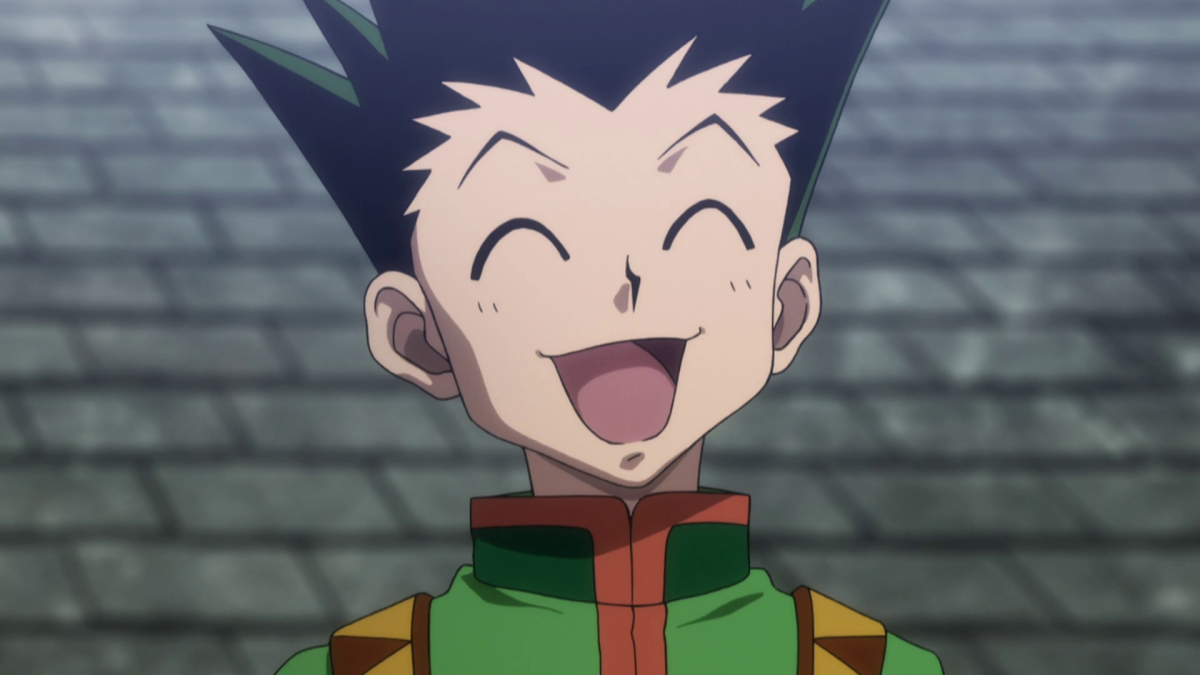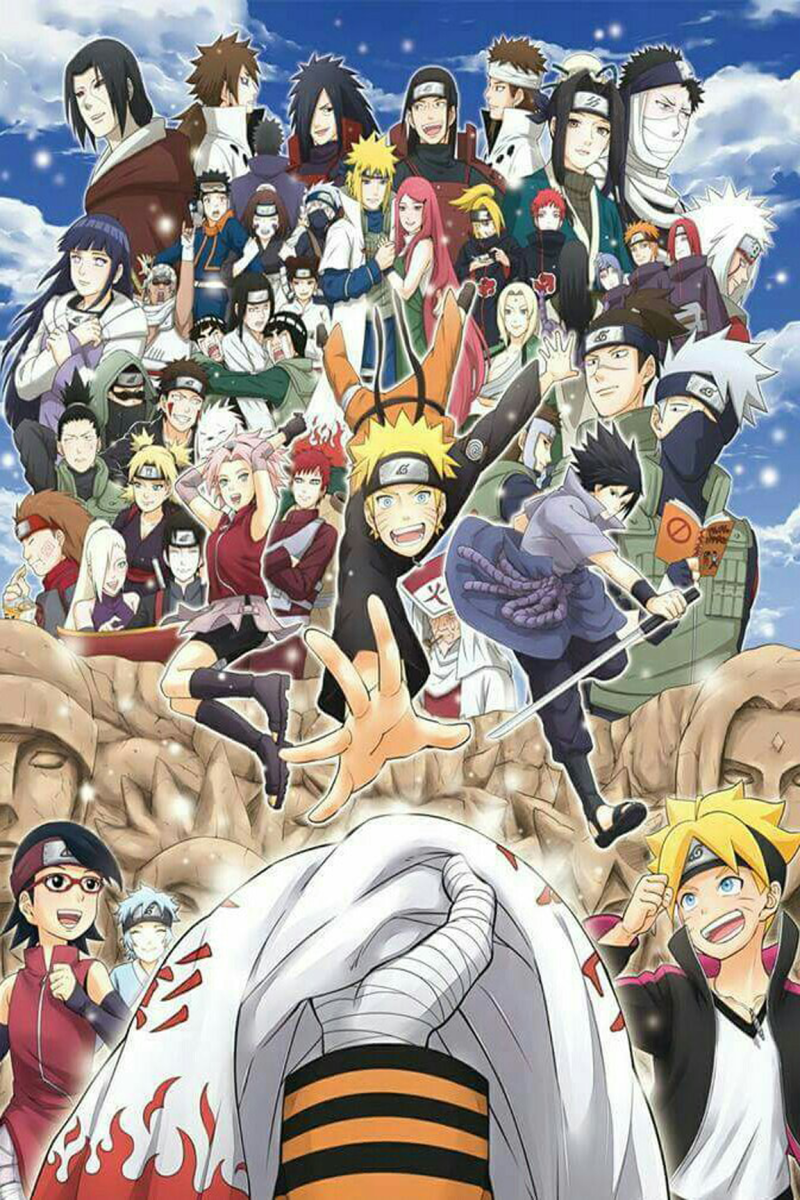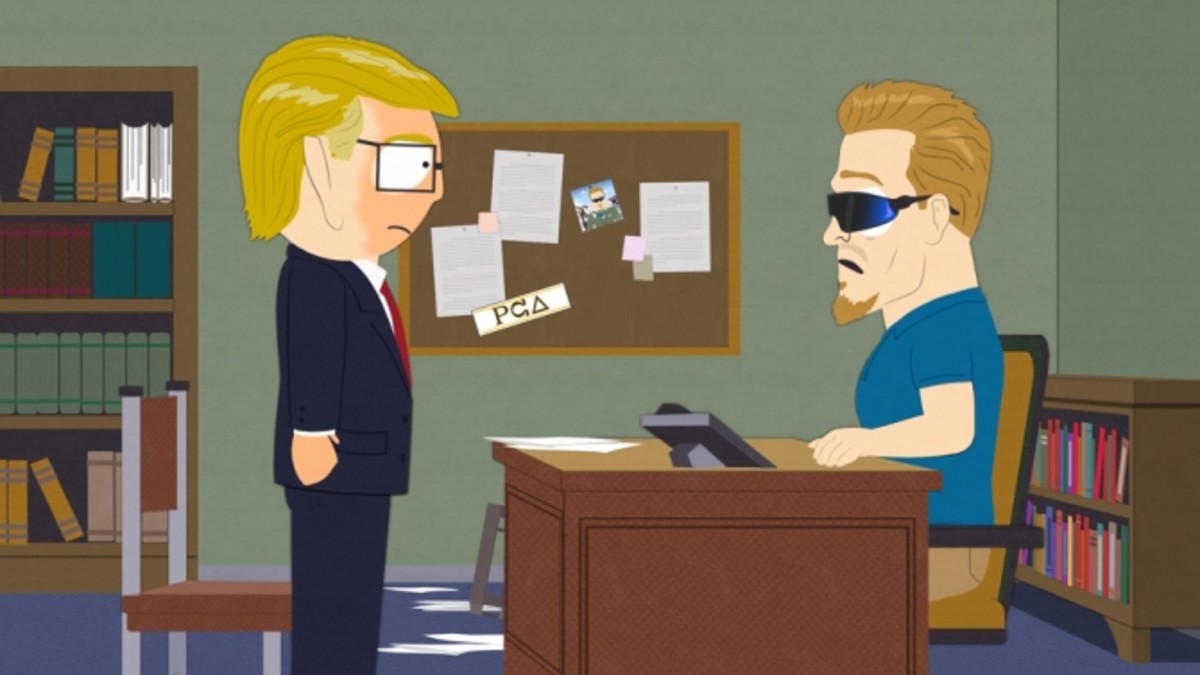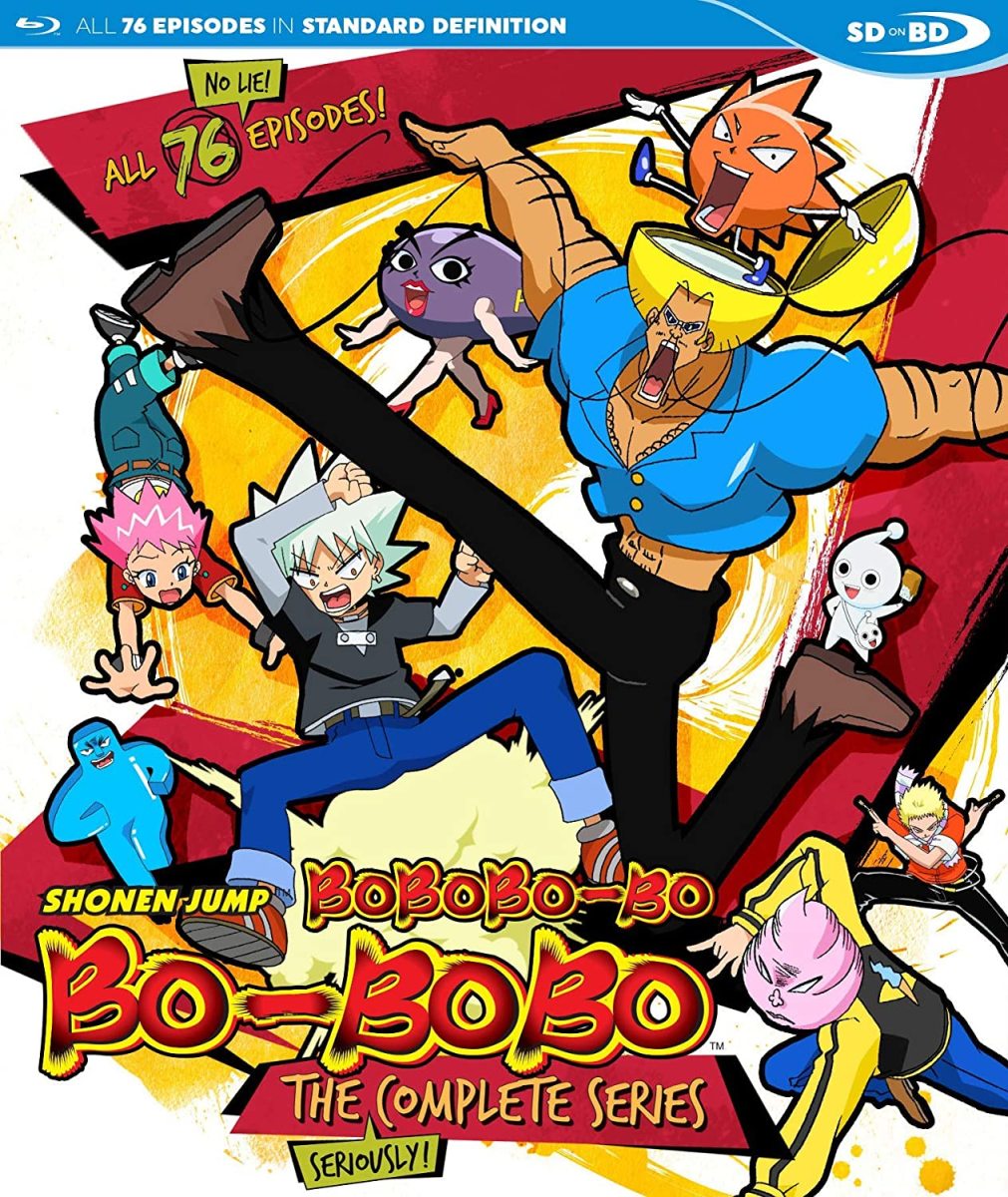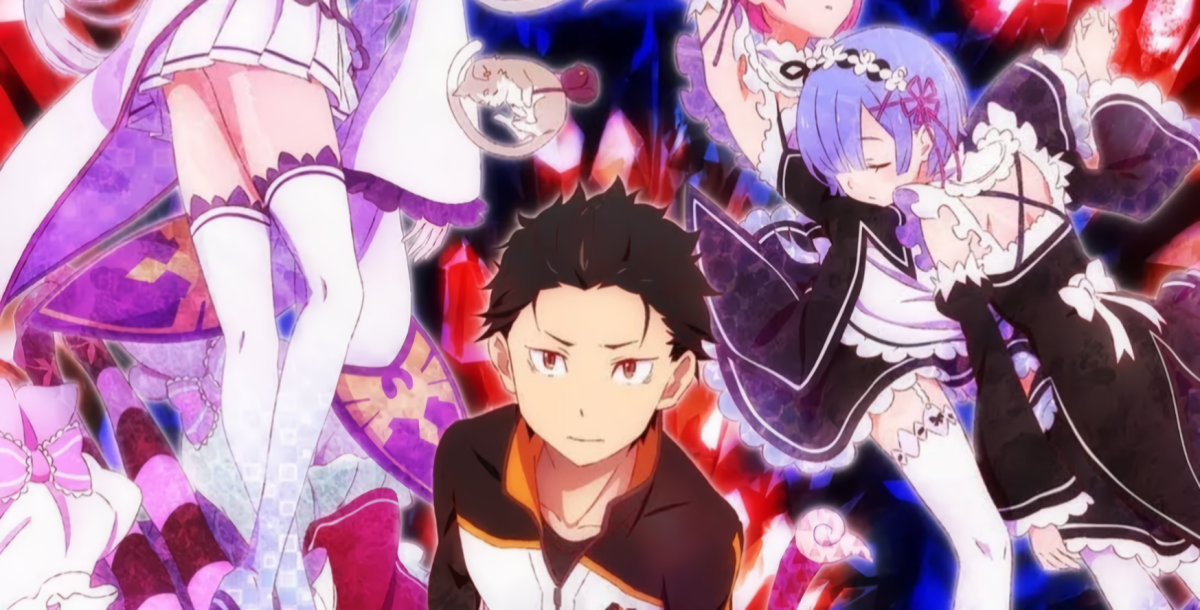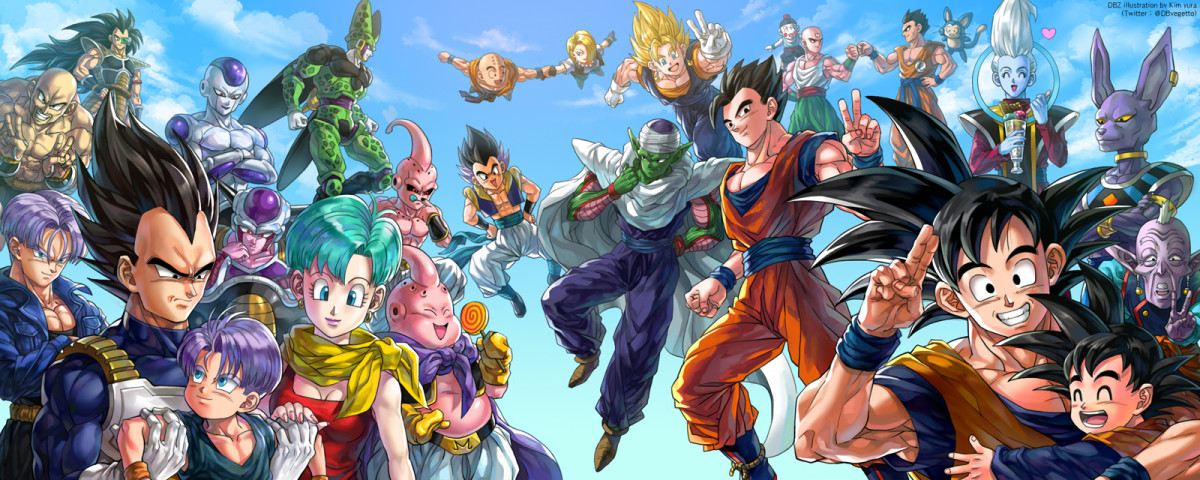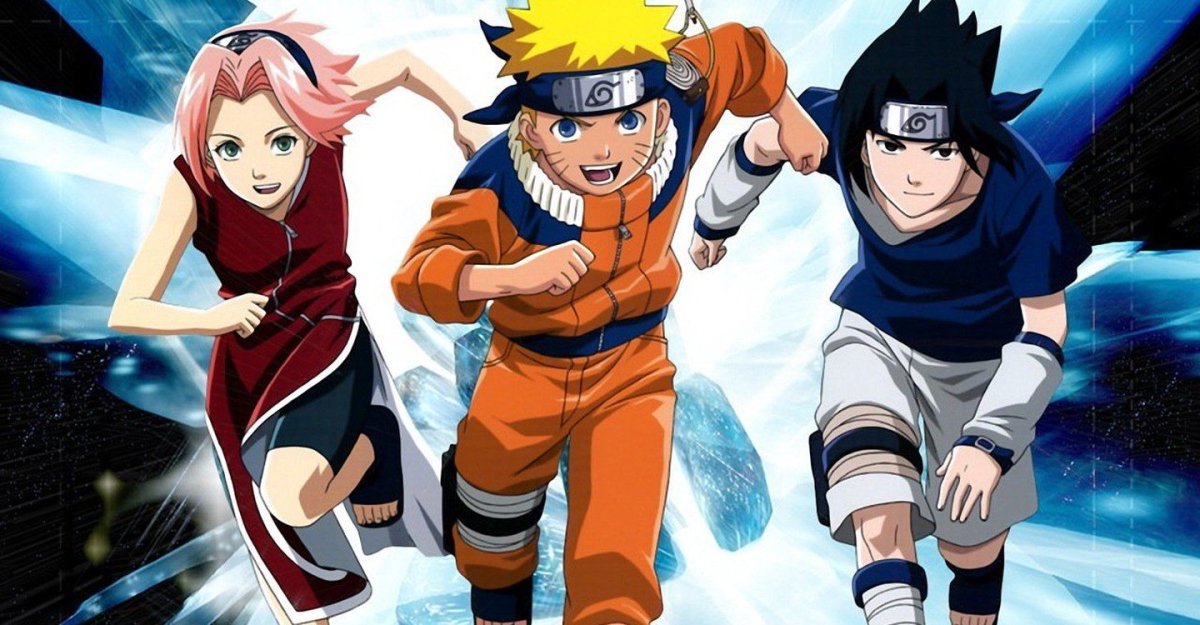Hunter x Hunter (2011) Anime Review
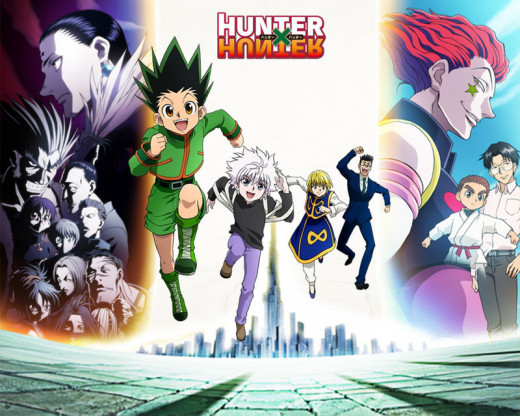
WARNING: The story section and onwards contain major spoilers for the entirety of the Hunter x Hunter (2011) anime, and there are minor spoilers before that section.
Hunter x Hunter (2011) is one of the most acclaimed anime of the decade so far. Although the correct pronunciation of its name confuses many people, (seriously, why put an x in there when it isn't meant to be pronounced? Even then, what does this x even mean if it isn't pronounced? Hunter squared? In that case, it would actually be called H squared + U squared + N squared + T squared + E squared + R squared) Hunter x Hunter actually deserves a lot of its praise, unlike most popular anime. But I'd argue that a lot of the attention it's garnered here in the West is due to how similar it is to "gateway" anime such as Naruto, One Piece, and Bleach.
But it's best to learn some context about this show before analysis commencement, because that could give better perspective considering how vast the show is. It originally began back in 1998 as a manga by Yoshishiro Togashi that has yet to be concluded. The only other well-known manga Togashi has ever written is Yu Yu Hakusho, which is notable for being somewhat different from other shounen titles. Although my experience with it is limited to smaller glimpses of the anime and manga, the general consensus seems to think that it is less campy and places more emphasis on the characters than other shounen from the 90s. This fact of Togashi's writing being an outlier of sorts in the realm of shounen is one of the main reasons that someone would be interested in any of his work.
Anyway, the reason that the Hunter x Hunter manga has not ended yet is not because it is obscenely long, (well, relative to other shounen titles) but because Togashi writes chapters at at a sluggish pace, albeit not as slow as Kentaro Miura is with Berserk. Apparently this is because Togashi has had numerous health problems throughout the past eight or so years, which is unfortunate for both him and fans of the series.
Hunter x Hunter's first anime began in 1999 and ended in 2001 at 62 episodes total. The anime then continued via a series of OVAs totaling 30 episodes. This means that the 1999 adaptation as a whole is 92 episodes, ending in 2004. Seven years later, in 2011, studio Madhouse picks up the rights to the series in order to make their own adaptation, but not to continue it from where the last anime left off. Instead, they begin redoing the entire series from the beginning. This version, being by far the more notorious one and the one which this analysis deals with, ended in September 2014 at 148 episodes total. Although the 2011 version was ended by the fact that there was no manga left to be adapted, 73 of its episodes consist of material that was never adapted in the 1999 version.
Here we reach an area of discrepancy. Why was it that it took the 2011 version only 75 episodes to cover what was done in the 1999 version in 92 episodes? Well, apparently five episodes of the 1999 version are filler, and the 2011 version has 2 episodes of filler. This leaves the count at 73 compared to 87. What exactly caused 14 entire episodes of content to disappear from the newer version? Since I haven't actually seen the 1999 version, I'll have to make assumptions based on things said by other people. Some say that the older version had more emphasis placed on specific character interactions, and that's probably what caused the 14 episode difference. Of course the most important thing in this situation is whether or not the added length of the 1999 version hurts or helps it compared to the 2011 version, but you'll have to answer that yourself. (Or just read this comparison that someone on reddit made.)
Hunter x Hunter (1999) Episodes
Arc
| Episodes
| Episode count
|
|---|---|---|
Hunter Exam
| 1-31
| 31
|
Zoldyck Family
| 32-36
| 5
|
Heavens Arena
| 37-44
| 8
|
Yorknew City
| 45-70
| 26
|
Greed Island
| 71-92
| 22
|
Hunter x Hunter (2011) Episodes
Arc
| Episodes
| Episode Count
|
|---|---|---|
Hunter Exam
| 1-21
| 21
|
Zoldyck Family
| 22-26
| 5
|
Heavens Arena
| 27-38
| 12
|
Yorknew City
| 39-58
| 20
|
Greed Island
| 59-75
| 17
|
Chimera Ants
| 76-136
| 61
|
13th Hunter Chairman Election
| 137-148
| 12
|
Characters
Even though Gon, Killua, Kurapika and Leorio are normally depicted as being the "main" characters of the series, over half of the show does not involve the latter two at all. I suppose Togashi plans to do more with both Leorio and Kurapika in future installments of the manga. But this still does not change how flabbergasting it is for them to be put on such a pedestal relative to most of the other characters early on, but not have much appearance at all past the Yorknew City Arc.
Gon Freecss is the main protagonist. Almost all of his actions are based on the fact that he is persistent, naïve, and also considerably compassionate about his goals and the people around him. A lot of the time it is these traits of his that drive the narrative, and sometimes they make things feel repetitive or overly persistent, though keep in mind that his extreme behavior is toned down a decent amount compared to the manga. This is puzzling, as it makes it seem like the only reason Gon is around a lot of the time is because he's the protagonist and things happen when he is around, and not because there is any enthralling drive or presence associated with his character (of course you could say that he's driven by wanting to see his dad, but that objective sits in the background most of the time). Since most of the other characters have seemingly more developed or dynamic personalities, and are probably more memorable than him, he gets little focus compared to a standard protagonist
With this in mind, it becomes clear that the protagonist's involvement in the different arcs is more a setup for the main plot of said arc, rather than something intended to be precisely about the protagonist. Although this is not necessarily a bad thing, since at least he actually has personality and affects the story. Still, It's hard to invest oneself in a protagonist whenever their interactions in the story are massively overshadowed by how much importance is placed on the other characters, and the fact that Gon's motivations are very seldom outlined in the narrative. Basically, the main reason someone would be interested in this show is not because of the protagonist, as he remains constant most of the time while the rest of the characters fulfill the show's main essence.
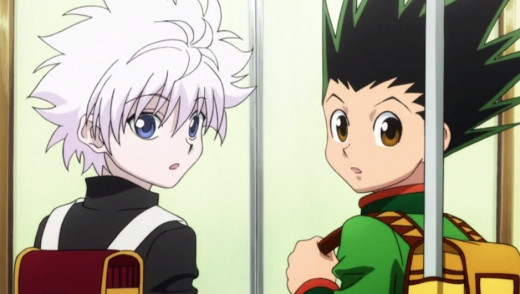
Killua Zoldyck is the second most occurring character in the series, mainly because him and Gon become virtually inseparable by the start of the Heavens Arena Arc. For the most part, he is a much more dynamic character than Gon, because his attitude actually changes over time and he has a more intricate backstory. He is also a much easier to follow due to him appearing less oblivious than Gon. The way in which he deals with his stubborn and traditional (traditional in a sense of staying true to the family) family is a conflict that keeps coming back. How he approaches his family's unyielding demeanor in different ways each time shows just how much he grows into someone that can truly think for himself, while rejecting the ideas of his family. This occurs with him being fully in the know as far as why the Zoldyck family acts that way, and why it is beneficial to them. This makes him out to be one of the stronger characters of the series. It's unfortunate that the story centers around Gon and not him.
Like Killua, Kurapika's main conflict centers on his origins, though his problems are of a much different nature. Normally Kurapika appears extremely composed despite the fact that he's a teenager, usually taking the most logical approaches possible and applying what can be called "honor" when he deems it necessary. These qualities instantly shatter whenever he is reminded of how his entire clan, called Kurta, was brutally murdered because of how valuable their red eyes are. This is exactly what makes his character interesting.
It could be said that his entire life philosophy is based on the Kurta people and what happened to them, (he's the only one left) but because we're never given any specific background on Kurapika's relation to the people or any memories he had of certain people, the entire existence of his relation to them is a little cloudy. Still, the way that he goes about perceiving the people who killed the Kurtas, the Phantom Troupe, forces him to somewhat abandon his admirable demeanor, and to me this is the highlight of the show's entire first half. Kurapika shows us just how easily someone composed can be torn up by the persistence of negative emotions, and the show does a rather nice job at this since it still keeps him as the same character while procedurally showing us how this malicious element manifests inside him. He leaves the story after the end of the Yorknew City arc, which is a letdown because I felt that they could have done a lot more with his character.
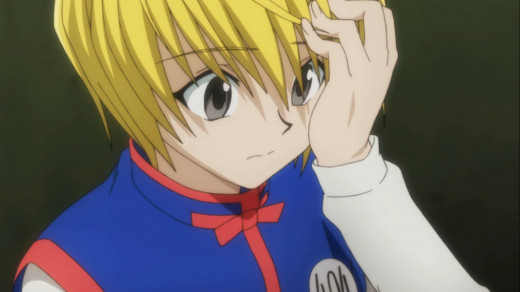
Leorio Paladiknight (spelled Paradiknight in some iterations) has the least plot influence of any of the four "main" characters. At first, he exists mainly to contrast Kurapika, but it becomes apparent early on that he only does so at a surface level. In episode four, Leorio admits that he wants to become a Hunter so he can have money, because with money you can get anything you want. He explains that he set out to do this because with money, he could have saved his dying friend--by explaining this he means to point out that he is not greedy. This entire part is a red herring of the sorts.
I thought that more depth was going to be put into Leorio's back story--that his aspirations of gaining money and the details of his friend dying were going to be expounded on--but neither of these things ever happen. Almost everything we ever learn of him relates directly to how he acts within the present moment. We never learn much about what Leorio does on his own, or what he was like before he met the other characters. It's weird how the show keeps bringing up certain ideas like this but never finalizes or concludes most of them.
But Leorio does contribute a good amount of personality to the show. Scenes such as the one where he gets infuriated because of disagreement add to the interactions between the characters and makes them feel more real. This is because these actions inhibit the other characters into giving their own thoughts regarding Leorio. This is one way of making character interactions engaging rather than them just being a bland set up for whatever action is going on.
After the Yorknew City Arc, Leorio completely exits the show for about 80 episodes. When he comes back he barely does anything with the other main characters, so he hardly has the charm that he had early on. I guess you could say he does act the same, but most of his involvement in the show's final arc is with people whom we barely know, and not the main characters. Having him interact more with Killua and Gon could have capitalized on the events that those two went through during Leorio's hiatus, and to me the show is missing out on part of what makes Leorio entertaining by not doing this.
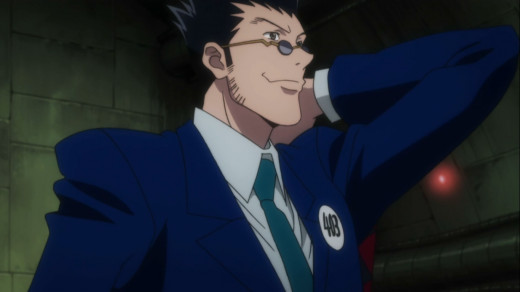
The fact that Leorio and Kurapika are virtually non-existent for half of the show is jarring considering the fact that Gon, Killua, Leorio, and Kurapika are usually together on the show's promotional material. Sure, Leorio and Kurapika are important for a good fourth/third of the show, but almost nothing is done with the relationships between them and the other 2 main characters outside of their initial reactions to each other. It's just weird that there's all these specific character interactions that build up to nothing (outside of the ones between Gon and Killua) over 148 episodes. Even if they do end up meaning something in the future, it still doesn't erase how nothing was done with it for about 100 episodes. It's as if they're verbally telling the audience that something is important, but they never get around to showing why it is important.
The main antagonist of the show is Hisoka, and it's somewhat difficult to call him an antagonist because there's many parts where he intentionally assists the protagonists. He isn't actually "against" them in the way that a traditional antagonist is. But to deny that Hisoka has a huge influence on the narrative would be silly, because he is essentially the glue that holds everything together and drives the main plot in the Hunter Exam Arc.
He forces the other main characters into submissive stances, and for the most part this is what makes his character intriguing because he keeps things mysterious. He also preserves the show's engaging nature because of how great intensity can arise from a highly consequential engagement between his odd behavior and the greatly disadvantaged protagonist. There's always this mystique of "what does he actually want?" or "who the hell is this guy?" These two inquiries are reinforced by Hisoka's attitude, in that he can be deliberate when he wants to be, but the amount of information he gives is often low in quantity, or whatever he is saying is only a smaller part of a larger system. The way by which he expresses himself makes it hard to not pay close attention to everything he says. This could be a side effect of how rarely he is deliberate, but his tone of voice and overall presentation of himself help in making him enthralling.
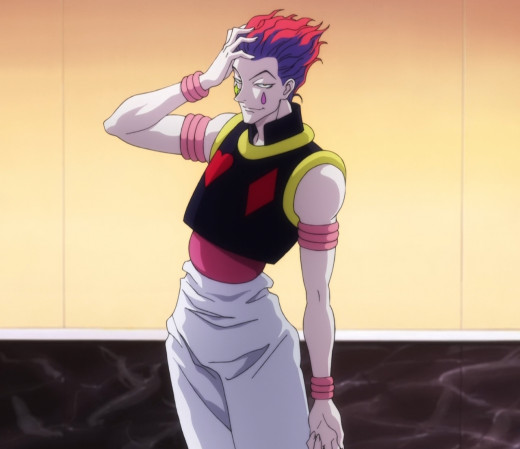
In other ways, Hisoka is a gigantic letdown as a character. Of course his overall presentation within the story is executed adequately, but what makes him out to be a huge distraction is his motivations. 148 episodes in, and the only thing that appears to motivate Hisoka is his desire to fight. Even if there actually is more to him later on, you'd think that they would have shown us that far before 148 episodes in. Since Hisoka has no real long-term goals or allegiance to anyone, it can be inferred that he is just an extremely dexterous madman who becomes aroused around young boys. I failed to see him as interesting anymore once it was revealed that there really isn't much to his character.
Most of the remaining characters of the show appear for only a relatively short amount of time or in only one arc. Even the ones that feel almost entirely defined by one character trait feel like they're more than that at times, which is nice since this makes things feel less stagnant.
A reoccurring event throughout the entirety of Hunter x Hunter is that of characters being introduced and then suddenly dying shortly thereafter. When you think about it, this is certainly better than having nameless nobodies always dying, but it is still kind of weird to have these characters cropping up who seem as if they are going to contribute something substantial to the plot but never end up doing so. This really is the only way you could fill up an immense world with characters who aren't important but still at least feel like they are important, if only for a short while. These characters still have their own quirks and personality as well, which is a nice addition that makes it so it is never obvious that a certain character is going to die soon.
Story
During its 148 episode venture, one element remains constant throughout Hunter x Hunter: the fact that it is based around battles that are strategic or intelligent. This is the epitome of the show, and the one of the main reasons anyone would enjoy it. This is what sets it far apart from the more "mainstream" battle shounen such as Naruto and Dragon Ball Z which rely heavily on giving characters power ups or abilities to accomplish anything. The reason why these more popular shows stoop to this standard when delivering their conflict resolution is simply because it is cool to see the protagonist build up a powerful ability and throw it at his opponent's face. I won't deny that the catharsis presented in these kind of situations is appealing, but a very similar feeling can still be achieved in a much less campy way.
Hunter x Hunter is a perfect example of how to convey the emotion of the more popular battle shounen anime, but in a much more tangible and engaging way. There are quite a few factors that make up why it is so adequate at doing this. For one, the rules set with specific powers rarely feel like "spur of the moment" writing, and the show actually sticks within its own rules while still advancing towards the insanity and ridiculousness that battle shounen are known for. This is important, because if nothing feels set in stone and new ideas are coming up all the time and breaking previous rules, then it becomes difficult for there to be any weight to the story, diminishing many of the benefits that come with believability.
Secondly, situations never feel like a repeat of something that happened before. It is quite impressive of Togashi to think of so many events with most of them feeling at least slightly original while veering off from anything else the show had done previously. Third, exposition for battle scenes is generally not done by having a character explain everything to their enemy. Of course there were quite a few moments in which characters announced their strategy to their opponent, and these particular scenes had me literally yelling at the screen in agony, but the degree to which this show does this is far less than normal.
Unfortunately this entire strategic endeavor starts to become weary as the show progresses, as characters begin getting placed in increasingly silly situations which contrast the generally serious nature of the show. The pathway to actually taking things seriously becomes rigorous when such baffling situations present themselves, such as a character being brutally injured because he was turned into a dart board, or another character avoiding damage by spinning around like a top. But things like this are probably inevitable when the author is constantly thinking of new ideas within the context of one rather long story.
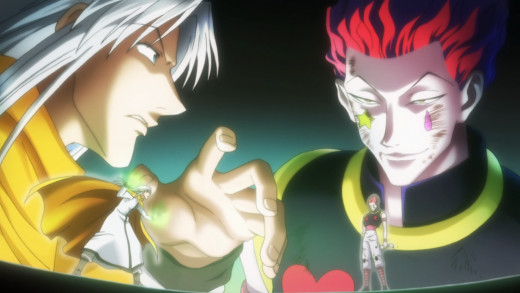
Because of how the events of the show transpire and are depicted, the action never feels inconsequential, bland, or repetitive. The consequential nature of the fights stems from how it is never extremely obvious what the result of a specific engagement will be, and this is further aided by how the characters involved always have distinct traits and personality. It is not bland or repetitive because the show is never pounding the audience with non-stop violence and the particular actions that characters partake in within the engagement do not feel unimportant. Some examples in which action is bland or repetitive are Sword Art Online and Akame ga Kill. Sword Art Online's action is mainly just Kirito swinging his sword a bunch of times until his opponent dies, with very little tension or variation to be seen. Akame ga Kill's action always felt synthetic and rushed because of how easily one side could win in an instant and it seemed like something was dying in every single episode. It is safe to say that Hunter x Hunter's action is far better than what is done in either of those titles.
But then there is one major element of the show that really irks me: how the dialogue almost always directly deals with the situation at hand. Perhaps this is a little difficult to put into words, so I'll try to go into more detail regarding what I actually mean by this. For at least the first half of the show, the plot progresses with barely any focus on the personal thoughts and feelings of any of the characters. Sure, it does utilize the thoughts of the characters often, but that is mainly used as an expositional or explanatory device for the happenings of the various battles, and rarely more than that. As a result, the characters exist to serve the situations they are in, and not the other way around. This is why I would call the characters of the show adequate at a basic level, but rarely any more than that. We are shown the characters' personalities and general composure, but nothing more than that, which makes them sort of bland in the long-term. (I'm speaking in a general sense of the show up until the end of the Greed Island Arc. Keep in mind there's a few exceptions.)
It is quite jarring for the show to spend so much time centered around Gon and Killua, yet neither of them get much development from a mental or emotional standpoint. Of course, Killua gets a decent amount of development but this concept sits in the background mainly and only appears a few times. One might counter this complaint by saying "but Legend of the Galactic Heroes doesn't have development most of the time and it works for the show in the long run." This is true, but Reinhard and Yang don't have nearly as much screen time as Gon and Killua, and the main focus of that show was the galaxy as a whole, and in fact the galaxy does change quite often over the course of the show. Since Gon and Killua have so much prevalence in Hunter x Hunter as a whole, and they are the only constant factor over all 7 arcs, it can be concluded that Hunter x Hunter is more stagnant than Legend of the Galactic Heroes. Of course this does not mean that it is hugely stagnant, but that it foregoes many of the things it could have done if its characters were more dynamic.
The show's stagnance from a character standpoint is why I find it to be frequently boring and uninspiring. Sure, the battle sequences and overall setup were fun and all, but it's perplexing to have all these neatly interwoven and thought-out ideas, but only use them to make things interesting in a sensual and rational way. This complaint of mine is further bolstered by the copious amount of characters who exist without making direct contribution to the show thematically and/or do not feel as if they are actually important relative to the other characters. This happens while said characters have plenty of dialogue and are usually in close bounds of the other main characters.
Another thing that annoys me about the show is the relationship between Gon and Killua. Despite spending so much time together, it rarely felt like the two had any sort of connection. They lack apparent chemistry, and it is not clear if either of them actually know much about each other or consider one another highly. They each operate on entirely different paths of thought, as Killua appears eons ahead of Gon in terms of maturity, so it is odd for the show to never address this and to never have any conflict between the two because of this, instead portraying them as close friends for no apparent reason. One might argue that "they're only children," but Gon and Killua experience a wealth of situations one would not normally take part in as a child, so it would make sense if them being involved in those events somehow accelerated their mental cognition to be more adult-like.
The antagonists of Hunter x Hunter are far off from the way antagonists are normally done in battle shounen. The villains never appear to be obtusely evil people who cackle like a mad scientist and wouldn't hesitate to commit an act of sadism just to make the audience hate them. Although they are certainly less likable than the protagonists, the antagonists feel believably "evil," and the story does not force their "evilness" upon the audience. This is because everything is depicted in a neutral manner, and the audience is supposed to decide for themselves what they think of the antagonists instead of the show sending the message "THEY ARE BAD" in boldset letters.
At the end of each episode, the narrator has a habit of telling us everything that was just shown, which is redundant. Things finally start feeling more genuine once the narrator says nothing at the end of the episode and the audience is meant to take in things on their own. The only time the narrator contributes anything necessary is when he outlines the thoughts of the characters.
When an episode starts, it often starts a few scenes before the last episode ended. This can be annoying if one views the show in rapid succession. Think of how much time is wasted if this is done almost every episode. If each episode spends a whole minute with things that were already shown in the last episode, then over two hours of viewing would be wasted given that there are over 120 episodes in the show (1 minute * ~130= 2 hours and 10 minutes). This, as well as the summary at the end of each episode, were probably done to account for younger viewers and possibly to decrease the budget. It's fine and all that Madhouse knows how to make things efficient as possible, but these elements of the show are bothersome nonetheless.
Specific Arcs
Since Hunter x Hunter contains a hefty amount of content, I think that breaking things down into the specific arcs and giving my thoughts on each will decrease the amount of generalities in this writing.
Hunter Exam
The Hunter Exam Arc's first few episodes were a little off-putting in terms of their presentation and general makeup. The first episode seems to edge between realism and obtuse ridiculousness quite often. For example: the ship that gets hurdled hundreds of feet into the air but remaining completely intact when it lands. The entire setup of this first episode is rather cloudy, but the major characters involved feel well inset and much more defined. Both of these combine to make a weird contrast which I'm not sure I can fairly call a negative point, although it still confounds me.
The second episode irritated me about as much as the first one, but in a much different way. The part where Gon, Leorio and Kurapika have to answer the question to pass the old woman puzzled me. By the evidence he gave, it was hard to deduce how Kurapika figured out this whole ordeal. Perhaps it was as simple as "how could anyone possibly choose to have either their wife or daughter live," so maybe I am overthinking this. Also the part where the yellow creatures trick the protagonists is weird. It is nice that it relies on Gon's high sensory perception to make this scene make sense, but I wish they would have given the audience an easier way to see this twist coming. It felt like it was turning the tables out of nowhere without giving much foreshadowing.
In many instances, random tryouts of the Hunter Exam die around the main characters. It's very odd that nobody acts in disgust or seems to even acknowledge that people are constantly dying around them. This contradicts the show in a way, since death is shown in a serious light within other instances. These moments don't appear to fit with the rest of the show at all.
The rest of this arc is a good example for how the entire show normally behaves. it does an excellent job at piecing together its conflicts and challenges. For me, this arc had a high aura of "holy crap what is going to happen next" that really drove the show from an entertainment perspective due to how diverse all the situations the characters are put in are. Even though some emphasis is placed on the characters in this arc, for the most part it is about the events they are placed in. This is fine considering this is basically the exposition arc, as it introduces each of the characters reasonably well without veering off of the main story's path.
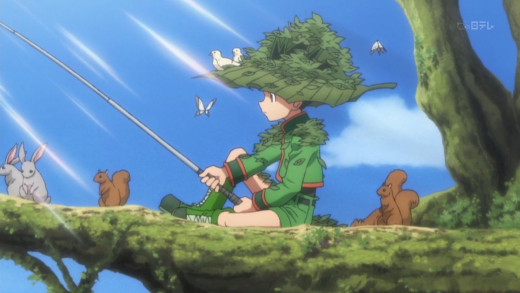
Zoldyck Family
Since the Zoldyck Family Arc is only five episodes long, there is very little to say about it. Although some things in this arc are important and portrayed well, such as Gon's determination to "save" Killua and Killua's change of behavior with his family, most of the rest of it felt like pointless meandering. Why should the audience care about the backstories of the Zoldyck butlers? They have almost no presence in the rest of the show, and we know almost nothing about them, so why would giving them details be important? Furthermore, the coin toss game with the main butler felt like it was tacked on to provide tension because it has almost no significance to anything else and ended quickly anyway. The characters seem to completely forget that someone's life was put at stake over a coin toss game, which is also weird, as if they are oblivious to anything not in the present.
Heavens Arena
The main purpose of the Heavens Arena arc is to introduce the idea of "nen" into the series, as well as further the progress of our two main characters. A good amount of this arc is spent expositing the ideas, techniques and such that hunters typically use. At times, this can make it quite boring if you aren't all that interested in these things, although they do help in fleshing out the world a considerable amount. Some of the engagements in this arc are probably the most memorable the series has to offer, including the one between Hisoka and Gon with its high use of fluid and quick animation. This fight in particular is enthralling due to how it contradicts the rest of the show's fights, as it simply has the two quickly throwing excessive attacks at each other, and not standing and explaining things or thinking things through for 3 minutes straight. It's nice that they decided on such a change of pace for this instance, as it helps differentiate this moment from other ones.
The antagonists in this arc could be considered one-note, since they always act like sniveling bad guys up until the very end of the arc. Maybe there was no way of pulling off the major conflict of this arc without having them act like that, but it's still unsettling just how simple these characters are compared to everyone around them.
Yorknew City
The Yorknew City arc has far more dire circumstances than the previous three arcs. It introduces the Phantom Troupe, the group who killed most of the Kurta people. The Phantom Troupe is a very unusual antagonistic group. Although they clearly do things that any sane person would consider as "bad," the story is usually trying to pass them off in the same way as the rest of the cast. This allows for some enticing moments, such as their harmful ways being somewhat explained by their impoverished upbringing. However, I fail to see how that can be an excuse for them growing up to be murderers and thieves, so it felt as if the show was trying to get us to relate to characters that appear as barely more than a bunch of amoral, quibbling thugs that don't understand anything outside their relatively small sphere of knowledge. Maybe if more time was spent on their backstory, they could have felt more adequately justified.
The narrative's depiction of the Troupe feels even more out of place whenever they're put into comedic or light-hearted situations. Perhaps this is just the writing trying to make things more neutral, but I can't take anything they're doing as humorous whenever they're constantly killing people with no apparent remorse or being aware of what they are actually doing. What I also don't get is how the Troupe is able to appear in public without any problems. Shouldn't they be wanted criminals? Maybe the world of Hunter x Hunter is different from the real world in this respect, so that could explain it. You'd also think that the authorities of such a large city would appoint hunters as security to combat threats such as the Troupe, so this is another thing I wish would have been explained. Keep in mind that the overall portrayal of the Troupe is sufficient as it does not force the viewer into thinking any one thing about them, but there are just a lot of complications that hinder this effort to make things neutral while at the same time making the Troupe antagonistic.
The serious nature of this arc is pulled off quite well with its setup, pacing, and delivery of ideas. But the whole thing ended up feeling like a ruse since barely anything changed by the end and not much in this arc is ever touched on again. Yes, a few things did change, but for the amount of events and time put into this arc, the results feel very underwhelming.
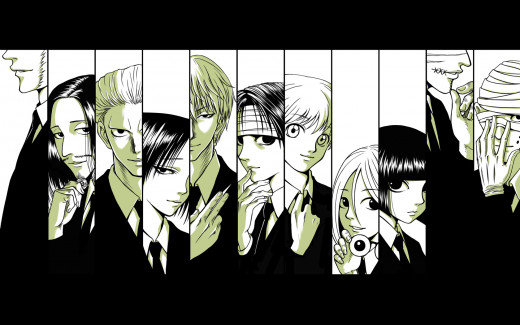
Greed Island
The Greed Island Arc is an extension of many of the show's previous elements. Once again, Gon and Killua train and then they fight some guys. It seems like a lot was put into the mechanics and makeup of this arc, even though none of it ultimately has an effect on the rest of the story. I thought Bisky was going to be some random person who ended up being someone at the same level as Gon and Killua that would affect them from a more balanced position. But no, she ends up being another character employed mainly to teach Gon and Killua. It's tiring for things to end up in similar ways so many times. A good amount of time is put into fleshing out Ging's friends and a few other characters in Greed Island from an emotional standpoint. Once again, the show is trying to get us to empathize with characters we barely know by pulling some backstory out of nowhere, instead of fleshing out or developing the only two characters who have been around for the past 60 or so episodes.
Once the big finale of the arc comes around, it ends up being the most camp-filled dodgeball match ever. It's rather annoying that everyone has to stop to talk or think about what just happened for three minutes anytime something happens in this match. This event also places almost no connection between the events and the individual characters, other than each character's abilities. Basically, if all the characters were replaced by completely different people who had the same abilities, it would end up being a very similar experience, which is bleak because it places little importance on the personal thoughts or feelings of the characters.
It bothers me that so much effort is spent explaining all of the terminology of everyone's moves, yet nobody seems to care about how Ging and his friends basically made magic or how they were even able to do that. Apparently smaller details are more important than the mechanic that would make everything currently happening impossible if it didn't exist.
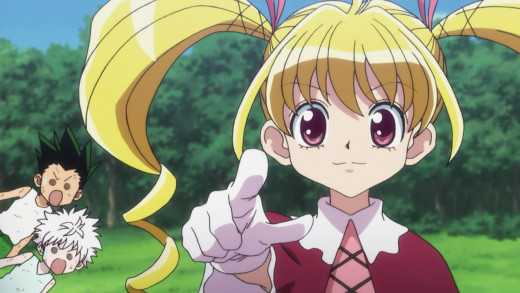
Chimera Ants
As indicated by the fact of it being over three times as long as most of the other arcs, the Chimera Ants arc is far by far the most ambitious segment of Hunter x Hunter. Since it mainly deals with giant, carnivorous ants whose individual shape and abilities replicate what their queen consumed before conceiving them, it is easy to infer what the theme of this arc is (i.e. is killing the ants any different from killing a human? are the ants really "bad" guys?). Once the hunters are called to exterminate the ants, the ants are already so human that it would be a stretch to call them ants, and some might question whether killing them is the same as killing an actual human. Furthermore, this arc is set up in a way so that neither side is given much choice on what they can do, which puts them in a position at which it would bring them a great detriment if they were to not go with the obvious answer (i.e. the humans have to kill the ants and they ants have to fight back). Since they are basically forced to take certain actions, it brings out many of the characters' inner ideals, thus making them feel more human or relatable.
It's hard to blame the ants for the conflict they cause, because it was always their nature to kill other things to survive, which is a great contrast from the Phantom Troupe who always felt like they weren't necessarily justified in the crimes they committed. Likewise, each ant develops an individual personality based on the personality of the specific human who was consumed to allow their birth to happen. This is contradictory of the very nature of an ant colony's tendency to be a collective entity rather than composed of many, smaller entities. Along with this, some ants begin stray away from the natural path, killing humans just for fun and not for the betterment of the colony. This group greatly opposes the ants who want to limit the amount of killing they do, while sticking to the general guidelines of the colony. Does this sound familiar? It should because these kinds of things are problems that real humans disagree upon, which makes the situation of the ants all the more believable and relatable even though they are not actually human.
This arc, which began as already more thematically involved than the rest of the series so far becomes even more so with the introduction of the four royal ants. Each of these four characters are completely different in their approaches and are basically superhuman in thought and physical prowess. The narrative makes sure to tale each of their positions, why they act the ways they do, and how they go about displaying their thoughts with an immense amount of detail. This is one of the main reasons that I think the finale of the Ant arc is genius, as it pieces together all of the different actions and thoughts of every character involved with so much detail so that the audience can be on board with basically every single character. Most of these characters are dynamic and highly defined in their actions, and this character integration is still done while the show's entertaining nature remains intact. It does all of this while coming off as completely natural and with very few inconsistencies or things that don't make sense. Even Shaiapouf, who is undoubtedly the most antagonistic character in the entire arc, is mostly justified in his actions, all thanks to how the story lets us know that. Even if this final third is insanely slow to the point at which literally entire episodes are in slow motion, it was still necessary to the story and handled reasonably well.
Gon and Killua also have a few moments in this arc that are unlike anything they did in the previous five arcs. Killua mostly resolves his issues with his family, but it is kind of silly that the reason for his doubtful thinking was because his brother literally put something in his head to make him act that way, and not because Killua actually thought these insecure thoughts on his own. This ends up making his development somewhat artificial since it was not entirely dependent on himself. Gon, on the other hand, gets a sort of wake-up call that finally makes him somewhat aware of his own naivety. His actions are now more based on his emotions and not sheer obliviousness or stubbornness, which ends up making him more fleshed-out as a result. Unfortunately, the main reason he acts this way gets undone later on, making this entire segment of his character feel pointless.
For me, Meruem is the most memorable character in the entire series. This is because of his fluidity and overall thought process, meaning that he always questions himself and ultimately values truth even though it may not seem like he thinks so at first. Despite his brutal awakening, his character is inspiring because he's left with so little evidence as to why he should divert his mind from his arrogant nature, though he still goes for what he really thinks is right in the end. Still, his decision at the very end of the arc to go see Komugi and cease his hostility felt like a huge jump in logic, so this made things feel rushed along with a few other decisions. For one, if the ants could be killed by explosions and poison, then why not just kill them with that in the first place instead of sending professionals to defeat them in close combat? Secondly, the entire "dying to poison" thing felt like it came out of nowhere, and it also eliminated what could have been done if things were taken a step further and the hunters ended up personally confronting Meruem. Even though the somber ending was pulled off decently well, I still think things could have been better without the poison suddenly killing off all the royal ants.
I think the Ant arc is the best part of the series by far, and whether or not the 75 episodes that it took to get to it was worth it is up for debate, even though other arcs are still good on their own. it's just that the Ant arc is far more unique and memorable the the rest of the series, and it's great that something of such merit exists in a battle shounen.
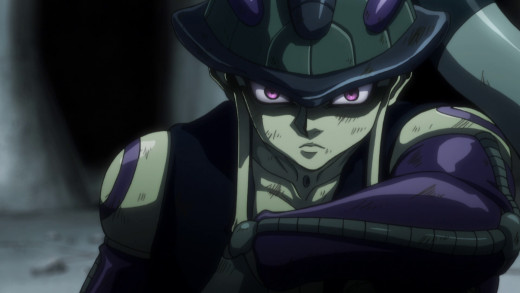
13th Hunter Chairman Election
The 13th Hunter Chairman Election Arc is what ruins a lot of what happened in the Chimera Ants Arc. This is mainly because it essentially resets all of Gon's development in the last arc due to how Kite comes back to life, and also most of the characters who were important to the Ant arc become insignificant in this one. The main conflict in this arc feels disconnected from the rest of the arcs due to the characters present, and the fact that it is based on a puzzling concept. This "puzzling concept," as I call it, is the entire existence of Alluka, since it wasn't evident that she even existed prior to the events of this arc. Even then, how did Killua figure out how her power works without dying? Was he some kind of toddler genius? Furthermore, wasn't Killua a massive loner who only cared about himself before he became acquainted with Gon? This incident with him and Alluka seems to contradict that notion so why wasn't more detail put into it? I really wish they would take the time to explain these things instead of broadly glazing over them as if they don't matter And why are the hunters just now upset about murderers being allowed to be hunters? You'd think this would have been a point of contention long ago, or something that should have been easily taken care of when the hunter documents were first made.
I really can't see how they could top the Ant arc, which involved the fate of the human race--pretty much the highest you can ever set the stakes at in fiction--so why continue the series for much longer after its conclusion? Unless of course it involves something ridiculous like space battles. And if the reason to continue the series is to add to Gon's development, then I wouldn't quite get that either, since they basically made all of his potential development from the Ant arc impossible since the world feels like it reset itself after the Chimera Ants Arc, excluding Netero's death. At least Gon ends up meeting his dad finally, and their encounter lives up to the 147-episode buildup to a degree. It was a nice way to conclude the series.
Animation & Sound
The animation of Hunter x Hunter is consistent the entire way through, though I wouldn't say that the style and some of the designs fit the mood completely. Some of the character designs are so silly-looking that it is hard to take them seriously whenever they are put into life and death situations, and whenever blood appears it looks like it does not belong in the otherwise flamboyant world that it exists in. A lot of the action scenes in general feel juxtapositional in that the violence seems to contradict the general aesthetic of the world it's taking place in. Perhaps things should have been darkened a bit. The animation is not astoundingly good like the animation in Zankyou no Terror, but it manages to never look subpar and stays stable without looking choppy or unnatural through the entire series, unlike many newer anime.
The sound scripting, as a whole, is very recycled. The same sounds are heard for almost anytime a character gets hurt, or hits something, or anything else that happens frequently over the show. The soundtrack stays mostly the same over the whole show, and this gets annoying whenever you start hearing a song you've already heard at least 20 times before. But there are a few instances in which sparingly-used tracks make an appearance. This helps emphasize the moods of the particular scenes well. The same opening song is used for every episode, excluding a few episodes that have no opening. The repetition could get very annoying for some, but this is to be expected for such a lengthy show. I would have liked if the opening song and the soundtrack changed at least once during the show's run, but I guess not doing that saves money, which is something studios generally try to do whenever they can.
Conclusion
Hunter x Hunter is one of the best battle shounen I've ever seen, and the only one that even comes close is Fullmetal Alchemist, though I'm not sure if I could consider that a battle shounen, and it's been a while since I've seen that so I can't compare it to Hunter fairly. But I digress--Hunter x Hunter's presentation, attention to detail, and characters make it enjoyable for about anyone, which is what makes it important in the realm of battle shounen. I would only consider one part of the show to be "great," because the rest of the series is held back by its repetition, relatively low amount of thematic and character integration, and general cheesiness.
The six arcs other than the Ant arc are far from bad, but are they outstanding? No, and some people might disagree with me for placing so much importance on character development and thematic depth. In response to these people, I'd say that an intellectual and emotional connection with the audience is a large part of what makes a narrative memorable, and is what makes it able to exist outside of its identity as simple entertainment. So since the six non-ant arcs never appeared to me as being able to establish a deep connection of this sort , I cannot consider them as "amazing" as some people might call it.
I think the reason the show is so well-received in the first place is because of its ability to draw viewers and keep them highly excited to see what happens next. While it's nice that it can do that, I would have to think highly of Sword Art Online if I judged by that criteria since I enjoyed it greatly during my first watch of it. If I did this, it would be ridiculous because anyone who knows anything about narrative strength should be able to give at least a few reasons for why Sword Art Online is garbage at best from a writing standpoint.
Anyway, Hunter x Hunter is surprisingly good considering its popularity, and I hope that future popular titles will use it as an example for how to setup a fantasy world while having it make sense and be entertaining at the same time.

